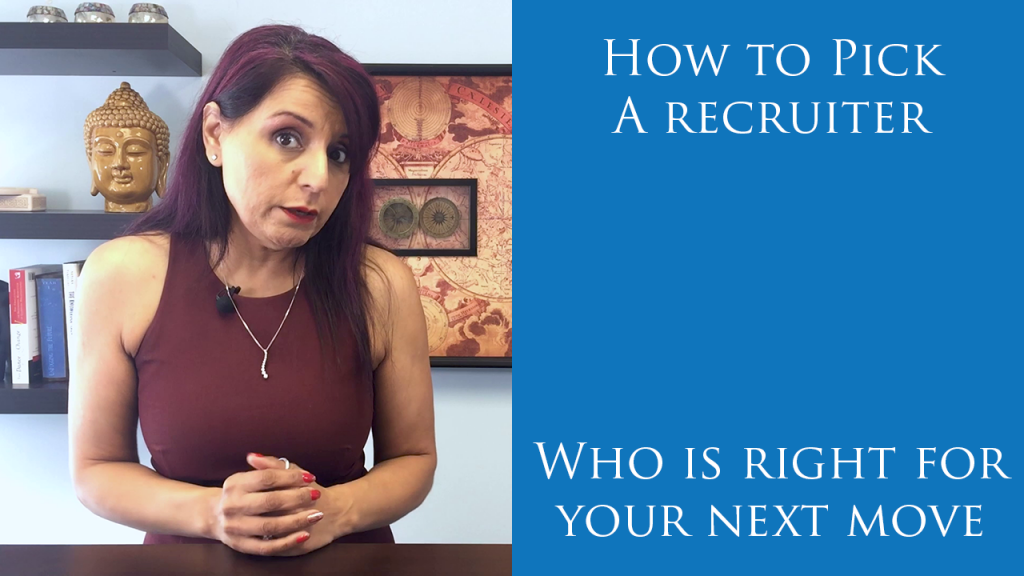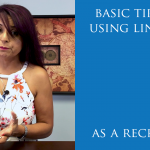In this week’s video, Suky goes in to how to best select the recruiter that’s right for your job search. Recruiters can also get some tips on how to better attract and retain their candidates!
Transcription
Hi I’m Suky from Professional Selection. Today I’d like to talk about how you go about selecting a recruiter for your next career search, for that next role. How do you know which recruiter you should be partnering with? Well there, as always there’s a number of different opinions, but in my opinion if you are looking to partner with a recruiter you should find somebody that specializes in your particular vertical. So for example if you’re an accountant, ideally you want to be looking for a recruiter or a company that specializes within the accounting field. Why? It’s because they’re gonna understand your vertical. They’re going to understand when we’re talking balance sheets, they know exactly what you’re talking about. When they’re talking about things like emptor and so forth, they know what you’re talking about.
So how do you go about finding that individual? Well as always best referral is friends, family, work colleagues and so forth, so that’s the obvious one. But also look at where you find your industry information. So maybe in a Accounting and Finance Association you know they’re called a number of different things depends where in the world you’re you’re listening to this video. Maybe look at newspaper adverts, magazines, go online see who’s talking about that industry and then explore that particular recruitment, recruiter or company further.
So okay, so now you’ve found a couple of recruiters that you think sticking with your Accounting and Finance you might be able to help you. So now how do you narrow that down to the right recruiter for you? First of all reach out to them. Now again, depending where you are I would pick up the phone and reach out to them, talk to them. Don’t go, don’t send them this long-winded generic email – that’s no good. Everybody’s busy they don’t have time to be reading a thousand ten page emails so what I would do is if you are going to email, I’d keep it short, sweet and relevant. Highlight your career successes, tell them what you’re looking for and ask to arrange for a time to speak. Now, human nature, some people are going to respond, some people are not going to respond. Those ones that don’t respond – don’t discount them straight away, for they may be on holiday or with all the anti viruses and spam it may accidentally have gone into spam. So I would definitely follow that up, but if they haven’t responded to you let it go and talk to the ones that have responded.
So how are they responding, now you’re going to get, we hear and read on LinkedIn all the time just an automated response. To me, that’s not a response. A recruiter should be able to take the time to send you either a personalized email or leave you a voice message. So out of the ones that have reached out to you here’s your opportunity – for lack of a better saying interview them yourself. Because after all, you’re trusting this individual with your career. So you really need to find somebody that truly is going to partner with you.
Now there’s no getting away from it, we’re all in business – recruiters or salespeople ultimately they have to find the right person to fill their role, and if you talk to somebody on the staffing side there’s an invoice involved. Internally there may not be an invoice involved but they still have that internal client and their KPIs and so forth to meet. So any recruiter that is worth their weight in gold is going to want to talk to to you and it’s all gonna start off with that conversation.
Now that conversation either could be telephone, could be Skype, again number of different avenues but they’re communicating with you so what should you be looking for? Well the list is long but some of the key things are how much interest are they showing in your career?
Are they talking you to fill that particular role that they have open or they’ve really taken the time to understand what you are looking for?
What is it that’s important to you in your next career move? Are they’re really getting to know you as an individual – what you like what you don’t like?
The follow-up stage from this is going to be they really should be either meeting with you face-to-face (again it really depends on the geography), Skype, a half-hour hour-long telephone conversation. Again this is one where they’re going to tell you more about the particular role that they’re recruiting for, and also understand what it is you are looking for. Don’t go with that recruiter that tells you how great you are. You already know how great you are! You want that recruiter that is going to be objective, is going to give you information that’ll really help you secure that next role.
So we all have areas of improvement. If a recruiter gives you an area of improvement don’t dismiss it, don’t get offended there. Actually it’s in their interest to make sure that you put your best foot forward. So for example it could be something as simple as you sound a little evasive on your answers. You may not feel you are but the recruiter may feel you are, that’s just something you need to bear in mind and ask them to clarify. Role play and that type of stuff will help you sort that out no problem. Also, what is that personal relationship you’ve developed with that recruiter?
Have you got a personal connection, do you feel that the recruiter has really built a rapport and got to know you? What it is you want and what you don’t want? OF course I’m sure there’s many other things to look for but that’s just some of the important ones.
Last but not least, don’t be frightened off by the misconceptions about recruiters! You are not going to be charged, certainly not in North America, you are not going to be charged by that recruiter for securing a position. You do not pay that – the client pays that fee, so don’t worry about an invoice coming. Also that fee is not taken off your salary! So for example, if the job is worth a hundred thousand, you’re not going to get anything less than a hundred thousand. The client is paying over and above that. So don’t fall into those misconceptions. Also recruiters don’t get paid until you actually find a position. Now I’m talking contingency here not retained, so it’s in their interest to help you secure the best role for you in terms of longevity, in terms of money, because ultimately it’s a win-win for everybody.
So certainly if you are now looking for a career move, you should start working and partnering with a recruiter. It’s always best to be proactive in your career search when working with a recruiter, versus being reactive.
As always, I’m sure there’s loads of different opinions and so forth, would love to hear them. Feel free to leave a comment below and thanks for listening.



